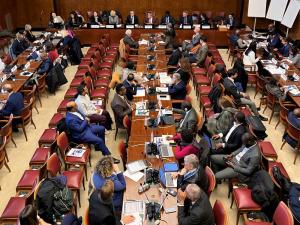Cooperation and management of transboundary waters, which span over 45% of the world's surface and serve as vital resources for nearly half of the global population, face the imminent threat of underfunding. The last reporting exercise on Sustainable Development Goals (SDG) indicator 6.5.2 (2020), highlighted that out of 129 countries reporting on SDG indicator 6.5.2, 76 indicated “resources constraints” as one of the main challenges faced in cooperating on transboundary waters.
As global water challenges are intensified by climate change, experts from both the water and finance community convened to address the urgent need to accelerate sustainable funding and financing for transboundary water cooperation and basin development at the Global workshop on Funding and Financing Transboundary Water Cooperation and Basin Development in Geneva on 5-6 December 2023. It brought together some 200 representatives from countries, river basin organizations (RBOs), international financial institutions, climate finance mechanisms, the private sector, as well as various UN entities and NGOs working on water and financing representing countries, and rivers basins.
Organized by the Water Convention secretariat, serviced by UNECE, under the leadership of Switzerland and the Netherlands, and in collaboration with Senegal, the Global Environment Facility (GEF), GEF IW:LEARN, the World Bank, the Asian Development Bank (ADB), the Inter-American Development Bank (IDB), the United Nations Capital Development Fund (UNCDF), and the Organization for Economic Cooperation and Development (OECD), this workshop aimed to explore and discuss how to further mobilize both public and private capital and bolster financial support for cross-border water cooperation and management.
In his keynote speech, Mr. Christopher Flensborg, Head of Climate and Sustainable Finance at Skandinaviska Enskilda Banken (SEB) - a Swedish bank, pioneer in green bonds and engaged in responsible investments since 2007 - shared insights on the challenges hindering the attraction of private capital for sustainable transboundary water management. He highlighted that water projects need to be translated in a language that speaks to private financers, adding depth to discussions on addressing perceived risks related to the transboundary aspects of certain water related projects, financial capacity constraints faced by countries, and unlocking the often-overlooked benefits of cross-border cooperation over shared water resources to further attract investments.
Experiences from countries and river basin organisations (RBOs) on basins such as the Senegal, Lempa, Okavango, Nile, Douro, Congo-Oubanghi Sanga or Sixaola enriched the discussion on how to put in place sustainable financial strategies to support the management of shared waters through dedicated cooperation mechanisms and development projects. From domestic budget allocation to grants via concessional loans, countries and RBOs agreed that public finance, both national and international, should be at the core of the management of transboundary waters, but also lays the groundwork to de-risk projects and attract other types of finance, such as private finance.
Innovative financial solutions for basin development activities were also discussed, exploring: how to enable RBOs to access capital, for example with the Blue peace financing initiative, led by SDC and UNCDF and being tested in the Gambia Basin for OMVG to be able to play a key role in supporting sustainable development the basin; how to create hybrid funding blending several financial sources such as in the Okavango basin, where OKACOM is setting up the CORB fund; or how revenues generated by energy production from shared hydropower infrastructures can be used to financially support transboundary water cooperation and management, as done by Itaipu Bi-national, which reinvests financial resources in protecting ecosystems of the Parana river shared between Paraguay and Brazil.
Interactive marketplaces hosted by key finance actors and technical partners such as the GEF, GEF IW:LEARN, the World Bank, SEB, UNCDF, the European Commission, ADB or the African Water Facility enabled the water and finance communities to exchange on how to leverage public, private and innovative finance in an efficient and sustainable way to better meet transboundary water management and cooperation needs.
Dedicating an entire day to private finance, the workshop reviewed different categories of private actors, such as banks, investment funds, information brokers, institutional investors or even foundations, looking at how their financial instruments and mechanisms could be further mobilized at basin level. One of the issues preventing efficient channelling of private finance to sustainable development of shared water basins is the need for countries and RBOs and private investors to speak the same language. Mr. Claude Gascon, Director of Strategy and Operations, at the Global Environment Facility highlighted that “water and environmental professionals are not fund managers, and bankers have little background in sustainable resource management; we need to more often bring these expert groups together to come up with innovative and durable financial mechanisms for a Healthy Planet and Healthy People.”


